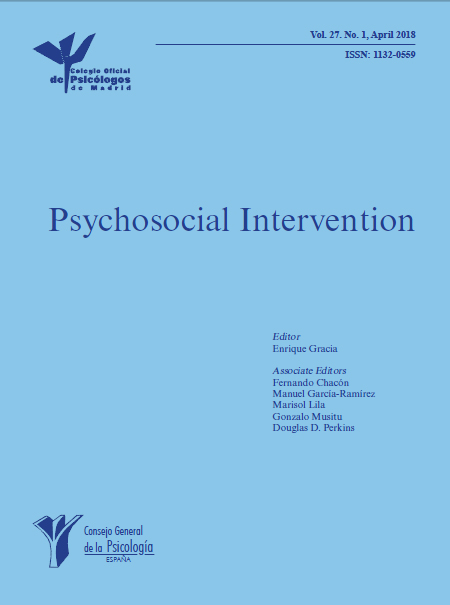
Predicting success indicators of an intervention programme for convicted intimate-partner violence offenders: The Contexto Programme
[Predicting success indicators of an intervention programme for convicted intimate-partner violence offenders: The Contexto Programme]
Marisol Lila1, Amparo Oliver2, Laura Galiana2 and Enrique Gracia1
1Department of Social Psychology, University of Valencia (Spain)
2Department of Methodology of the Behavioural Sciences, University of Valencia (Spain)
Abstract
Recent legal changes in Spain have led to an important increase in the number of men courtmandated to community-based partner violence offender intervention programmes. However, just a few of those interventions have been systematically examined. This study aims to predict success indicators of an intervention programme for convicted intimate-partner violence offenders. The sample consisted of 212 convicted intimate-partner violence offenders who participated in the Contexto Programme. Three “intervention gains” or target criteria were established (increasing the perceived severity of violence, increasing the responsibility assumption for one’s actions, and reducing the risk of recidivism). A structural equations model was tested, fitting data appropriately. Participants with major gain in recidivism risk were those who presented lower levels of alcohol consumption, shorter sentences, lower impulsivity, and a higher degree of life satisfaction. The largest gain in perceived severity was found in younger participants, participants with shorter sentences, lower alcohol consumption, higher life satisfaction, higher participation in their community, and higher self-esteem. And, finally, participants with the highest gains in responsibility assumption were older participants, participants who presented higher intimate support, higher anxiety, higher sexism, lower anger control, higher depression, higher impulsivity and higher self-esteem
Resumen
Los cambios legales introducidos recientemente en España han supuesto un incremento importante en la cifra de hombres condenados y derivados a programas de intervención en medio abierto para agresores. Sin embargo, aún son muy pocas las intervenciones evaluadas de forma rigurosa. Este estudio pretende predecir indicadores de éxito de un programa de intervención para hombres condenados por violencia contra la mujer en las relaciones de pareja. La muestra estaba compuesta por 212 hombres condenados por violencia contra la mujer en las relaciones de pareja, participantes en el Programa Contexto. Se establecieron tres indicadores o criterios de éxito (el incremento de la gravedad percibida de la violencia, el incremento de la asunción de responsabilidad de sus actos y la reducción del riego de reincidencia). Se estimó un modelo de ecuaciones estructurales, representando adecuadamente los datos. Los participantes con mayor ganancia en riesgo de reincidencia fueron aquellos con menor consumo de alcohol, menor tiempo de condena, menor impulsividad y mayor grado de satisfacción con la vida. La mayor ganancia en severidad percibida se encontró entre los participantes más jóvenes, con tiempos menores de condena, menor consumo de alcohol, mayor satisfacción con la vida, mayor participación en la comunidad y mayor autoestima. Finalmente, los participantes con mayores ganancias en asunción de responsabilidad fueron los de mayor edad, mayor apoyo íntimo, mayor ansiedad, mayor sexismo, menor control de la ira, mayor depresión, mayor impulsividad y mayor autoestima.
Keywords
partner-violence offenders; perceived severity of violence; responsibility assumption; risk of recidivism; structural equations model.
Palabras clave
maltratadores; gravedad percibida de la violencia; asunción de responsabilidad; riesgo de reincidencia; modelos de ecuaciones estructurales.
Copyright © 2026. Colegio Oficial de la Psicología de Madrid















